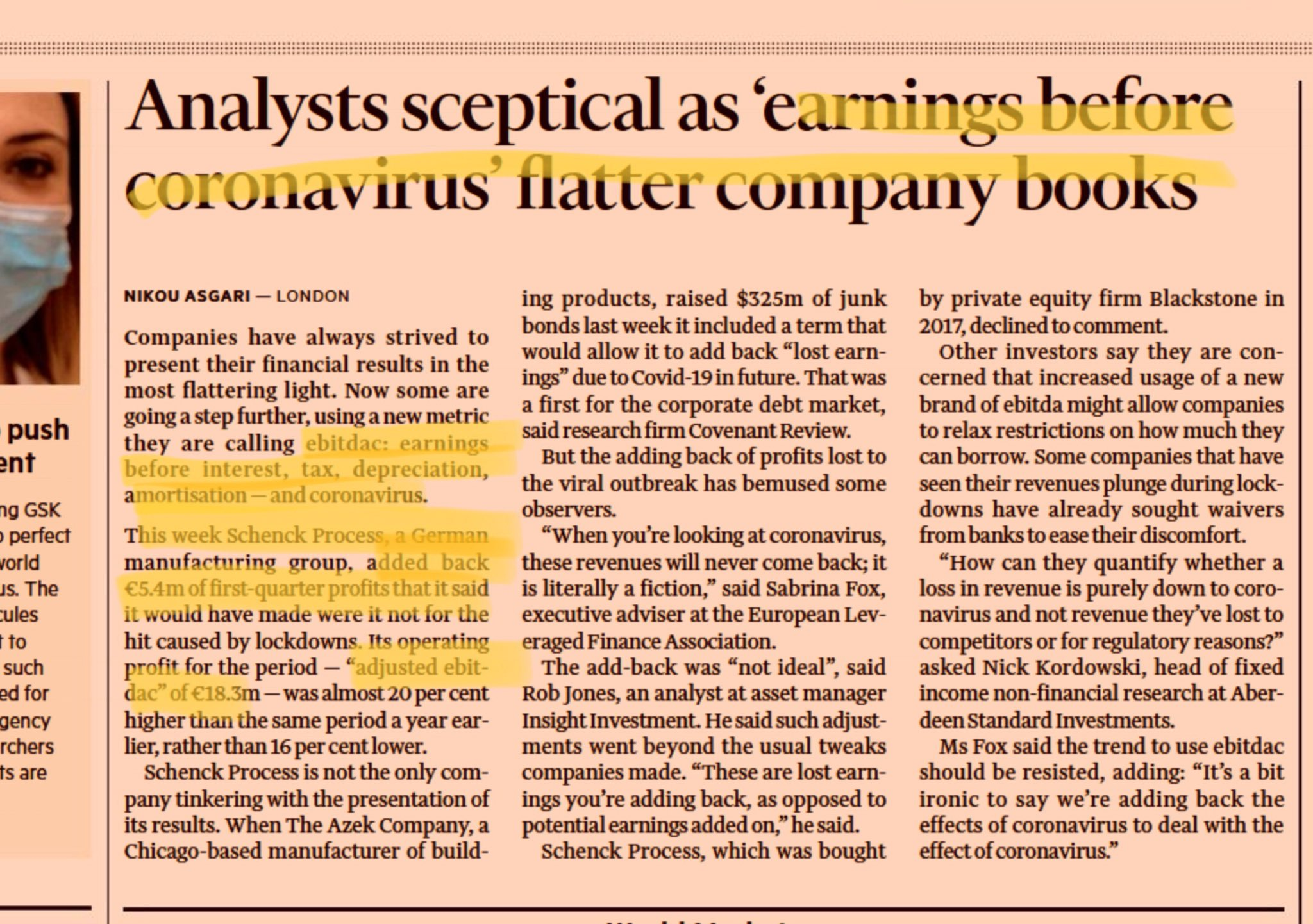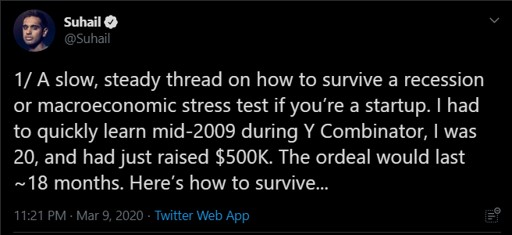Sunday Reads #91: Leadership in the time of Coronavirus
May 17, 2020 1:31 pm
Hope you and yours are keeping safe.
I'm back again with the most thought-provoking articles I've read in the week. (in case you missed my previous newsletter, you can find it here).
This week, we first take a look at effective crisis leadership. How can we rally our teams and do what needs to be done, when we ourselves are afraid and unsure?
Next, we talk about startups. How to survive a recession, from someone who found success from the depths of the 2008 recession..
And third, the new term that will replace EBITDA in financial results, come reporting season.
Here's the deal - Dive as deep as you want. Read my thoughts first. If you find them intriguing, read the main article. If you want to learn more, check out the related articles and books.
[PS. If you really like what I send you, I'd be honored if you could forward this to a friend. They can just sign up here.]
1. Leading through anxiety.
This is a strange, uneasy time.
Whether we're founders, executives, managers, or employees - we've all seen how fragile everything we've built has become. Almost overnight.
We're terrified and spending sleepless nights, wondering about the future. How can we also be the face of calm, convincing our colleagues that we'll get through this?
As Gianpiero Petriglieri says in The Psychology Behind Effective Crisis Leadership:
Leadership can never rest on vision alone.
The limitations of visionary leadership become transparent in times of crisis, uncertainty, or radical change.
What we need from leaders today is not vision.
What we need is psychological safety.
As leaders, we need to contain and interpret the uncertainty for the teams around us, so we can all move ahead with purpose. So we can focus our mental energies on doing what needs to be done.
How do we do this? How can we keep our anxiety from distracting us and zapping our strength? Right when we need to project this strength to our colleagues?
We know our teams have existential questions. How can we answer them truthfully, and yet motivate them?
Ron Carucci talks about this, in How to Answer an Unanswerable Question. As he says:
First, Acknowledge your own anxiety.
Label what you’re feeling. If you're worrying about worst-case scenarios, acknowledge that. Separate the probable from the possible.
Recognize that it's acceptable to be anxious. You have several people's expectations on you, and these expectations have only intensified.
Listen for the need underneath your team's questions.
Don't answer only the specific questions that your teams ask. Use the opportunity to also address the underlying concerns.
When asked about government subsidies available, don't talk only about what the company is eligible for vs. not. Also address the real question - job security. Talk about what you're doing to ensure financial stability - both of the company and its employees.
Don’t interpret questions as critique.
Anxious questions often arrive with an angry edge, or an insistent or judgmental tone. Recognize that, and answer the real question underneath.
Don't reply with instinctive self-righteousness. Respond with thought and empathy.
Practice your tone and physical delivery ahead of time.
And if you lose your composure, recover quickly.
Further reading:
- Leading Through Anxiety.
- Carta's COVID-19 layoff message: This is a great example of leadership. Making the unfortunate hard decision when there was no choice. Communicating it with empathy. And putting a strong support structure in place for the employees who are leaving.
[HT to Shilpa for sharing some of these great articles with me.]
2. How to survive a recession - Startup Edition.
Came across this helpful and actionable tweetstorm on how to survive a recession as a startup, from Suhail Doshi, founder of Mixpanel.
Check it out in its entirety, but some nuggets of actionable wisdom (emphasis mine):
Move to predictable revenue. Move to annuals, and to non-startup customer segments
Now is a good time, as you brace for impact, to get really focused with the resources you have instead of what you could have. Try to double down on your core products vs risky endeavors. You don’t need to stop hiring but a way to shift risk is to get pickier with hiring.
It's never been more important than right now to be honest with your team around burn rate, odds of success, areas to focus, etc. The folks who stick around will appreciate it & work hard. Some others might move to more stable pastures--that's fine. It's all hands on deck.
If your startup's market has shrunk and you're wondering if you should (a) wait for it to come back or (b) adjust yourself to its current size, the answer is probably (b).
If your business has > 50% odds today of layoffs due to cash constraints, you should have a plan for layoffs asap. This is sad to say but this will be so hard that to do it right it pays to plan ahead, find compassion, & have the runway to provide ample severance. Be kind.
And last:
Stay customer obsessed and they’ll remember you for it.
3. On a lighter note - Move over EBITDA, there's a new kid in town.
EBITDAC.
Or, Earnings Before Interest, Taxes, Depreciation, Amortization, and ...Coronavirus.
Not kidding. A Blackstone-funded German company modified its Q1 results, adding EUR 5.4M of profits that it says it would have made if it weren't for the virus.

Source: Safal Niveshak
I'm not sure if this article with guidelines on EBITDAC is tongue in cheek. Quite tragicomic that companies have to resort to this.
Charlie Munger once said, "Every time you see the word EBITDA, you should substitute the words 'bullshit earnings'.".
Wonder what he'd say about EBITDAC.
That's it for this week! Hope you liked the articles. Drop me a line (just hit reply or click on the "Leave a comment" button) and let me know what you think.
PS. If you recall, I'd written a few weeks ago about the mobile video platform Quibi, and why it will struggle despite a couple of billion dollars in funding. Seems like some of my predictions are starting to come true, ahead of schedule.
Jitha
